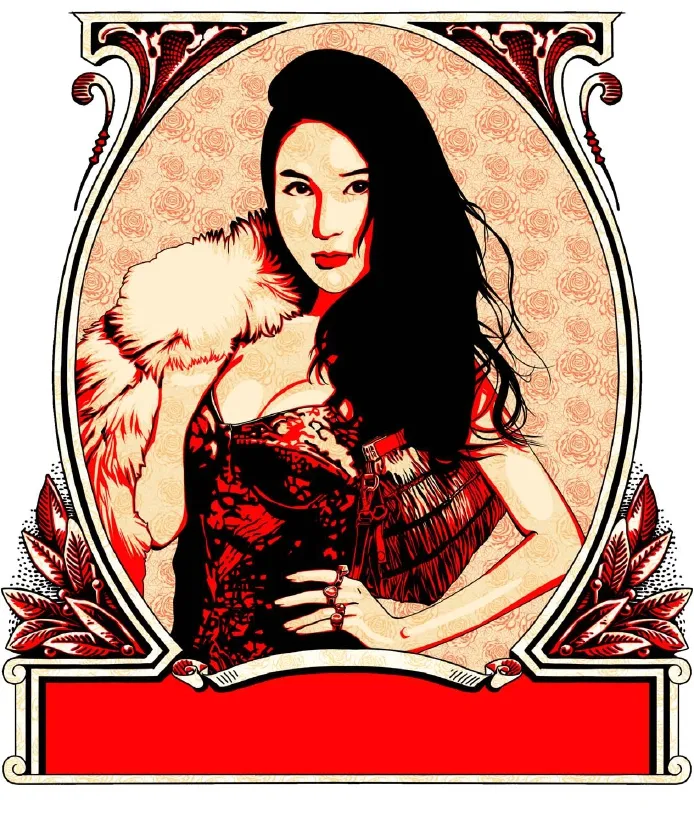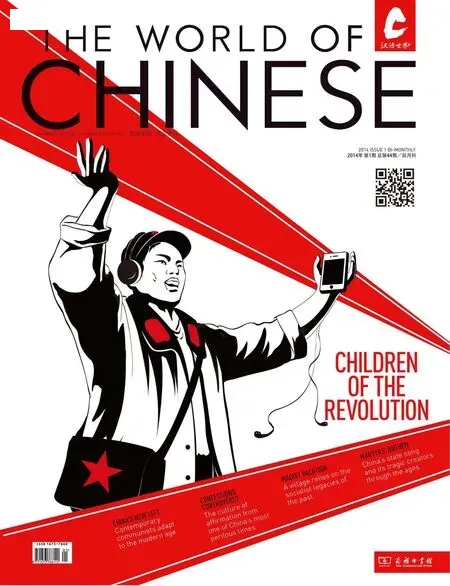CHINA'S GILDED TUHAO
BY GINGER HUANG (黄原竟)
CHINA'S GILDED TUHAO
BY GINGER HUANG (黄原竟)

Love them or hate them, the tuhao are back with a vengeance不管他们的行为多么乖僻,你仍然想要跟土豪做朋友
If you are still banging on about thexiaozi(小资, petty bourgeoisie), China's young middle class obsessed with their education and all things highbrow, then your knowledge of Chinese society is out of date by at least a decade. China's online public have taken a shameless turn toward heightened levels of snobbishness. Thexiaozi, with their Starbucks-stained French novels, are out, and thetuhao(土豪), “the tacky rich”, are in.
To be more specif i c,tumeans “tacky” or “uncouth”, whilehao, coming fromfuhao(富豪), means “the very rich”. The word fi rst went viral on Chinese social media, later appearing everywhere from subway ads to news headlines. It no longer serves as mere description for China's emerging, high-prof i lenouveau riche; it's any behavior that's deemed expensive and showing no class. And, iftuhaowere a color, that color would be gold. When Apple's gold iPhone 5s debuted, it sold out instantly, with prices reaching 13,000 RMB on the black market. Since then, the color has often been dubbed “tuhaogold” (土豪金), and anything made of“tuhaogold” easily grabs headlines, from gold sports cars to the newly renovatedPeople's Dailybuilding that (from certain angles) looks like a giant golden phallus—not to mention the path paved with 200 gold bricks in a Wuhan shopping mall. Even though this all seems vulgar,tuhaogold can lean toward the highbrow. China has been broadcasting the Vienna New Year's Concert since 1987, and, for Chinese people, the Großer Saal is probably much more familiar than the Teatro alla Scala— “sacred to musicians around the world”according to CCTV. Actually, anyone with the cash can make it happen. Simply known as the “Golden Hall” in Chinese, 133 concerts there were held by Chinese in 2013; the performers included summer camp children, middle school students, and business people who were willing to pay for their golden dream come true.
The rise of thetuhaoand the fall of thexiaoziis a product of China's newfound wealth. China, apart from being the world's biggest manufacturer, is also the world's fastest producer of rich people. According to the 2013 Hurun Rich List, China has 1.05 million millionaires (“millionaire”meaning an individual with personal assets of at least 10 million RMB), a three percent increase on the previous year and the biggest growth in the past fi ve years. Hell, if you thought that was impressive, get this: there are currently 8,100 billionaires in China—China'sdafuhao(大富豪, the super rich). And if your disposable assets are a mere one million USD, then you are pretty much a pauper and in among the rabble that make-up China's 12 million-strong middle class.
This bad taste can take a terrible toll. There's Guo Meimei, for example, who at 22 has justif i ably become the princess of all thingstuhao—she's the ultimate combination of compulsive money fl aunting coupled with absolutely no brains whatsoever. She became notorious in 2011 for showing off her villa and her Maserati—all while claiming to be a manager at the China Red Cross. China Red Cross credibility was, of course, bankrupt after this, even though the story later turned out to be false. But with the controversy came fame, and now she just won't let up and continually posts pictures of her expensive designer goods, stirring up sporadic fi ts of rage online. People still doubt the legitimacy of the China Red Cross to this day.
The wordtuhaodoesn't always evoke such hatred, often merely drawing wide-eyed stares of sheer incredulousness. The grand inauguration ceremony of the new movie base Oriental Movie Metropolis in Qingdao (or Chollywood to the masses), was the brainchild of moneyed mastermind Wang Jianlin (thedafuhaothat invested 5 billion RMB in the project), currently the richest man in China according to the 2013 Forbes Rich List. Hoping to give his grand scheme an “international” fl avor, Wang effortlessly bought a long list of veteran A-list stars for the debut, including Leonardo DiCaprio, Nichole Kidman, Catherine Zeta-Jones, John Travolta, and Kate Beckinsale. To give it a genuine Oscar feel, Cheryl Isaacs, the president of the Academy of Motion Pictures, was also invited along, as were the CEOs and board directors of six major fi lm studios, including Warner Brothers, Sony, and Paramount. However, the supposed glamor soon went sour. The venue looked more like the opening of a rural market, and that was the least of their worries. The stars were rushed through the red carpet in 30 minutes fl at, allowing just enough time for a traditional opera performance by a middle-aged arts troupe and, of course, the obligatory 45-minute speeches by a series of dull governmental off i cials. This “Oriental Haollywood” even drew jeers
THE WORD TUHAO DOESN'T ALWAYS EVOkE SUCH HATRED, OFTEN MERELY DRAWING WIDE-EYED STARES OF SHEER INCREDULOUSNESSfrom Wang's own son. It was a classictuhaofail.
Tuhaois not a new word and once even had a touch of nobility. The word was fi rst found in the Song Dynasty (960-1279) chronicle,The Book of Song(《宋书》). Thistuhaoinitially referred to the rural gentry or landlords who held great local authority. However, in Communist China, as the word “landlord” became synonymous with evil and bullying, Mao Zedong def i nedtuhaoas “the most devilish part of the landlord class” in his essays. And when Mao spoke, people listened; as the early Chinese Communists built their bases in rural China, they pursued an aggressive policy to: “crackdown ontuhao, and split up their land.” (打土豪,分田地。) Under communist attack from the 30s to the 60s, thetuhaoas a class were virtually exterminated. But now,tuhaoare back and back in a big way; the early communist connotations contribute to the popularity, making it rather comic. While a century ago thetuhaowere the backbone of rural China, the moderntuhaosignal the slow brain-death of a nation. But, they have at least become the backbone of the world's luxury consumption. During the 2012 Spring Festival, Chinese tourists heroically and patriotically spent 7.2 billion USD on the European luxury goods market in just eight days. In 2013, 70 percent of European luxury goods were purchased by Chinese people. And, typical oftuhao, most of them used cash.
While many are jealous oftuhao's wealth, they're not necessarily as despised as one might think; in fact, most folk are chomping at the bit just to be friends with one. A popular online joke features a young man asking a Zen master, “I'm wealthy but very unhappy. What should I do to make myself happy?” Hearing this, the Zen master silently puts out an open hand. Watching the Zen master's reaction, the young man asks,“Master, do you mean I should show gratitude to the people who helped me and do something in return?”The master replies calmly, “No, no, no.Tuhao, can we be friends?”
Like many jokes, there's much truth in it, and a plethora of guides on how to befriendtuhaonow circulate online. “The Chinese Millionaire Wealth Report 2013” by the GMK-Hurun Wealth Report is often used as the guidebook of rich people's preferences and how to approach them. “If you want to get near to the super-rich, it's more likely to meet them in swimming pools than on golf courts,” a popular guide says; according to the report, swimming, not golf, is the favorite sport of the super-rich. The report shows that France and the United States are their favorite travel destinations. As for what gifts arede riguer: Louis Vuitton for men and Chanel for women are the most preferred brands. Apparently getting to know the paintings of Chen Danqing, reading, and learning about red wine will also get you in good with Chinese millionaires.
So, regardless of their lack of taste, proportion, and love of gold, the culture of thetuhaolooks like they might just be here to stay. Buoyed by success and society's mindless infatuation with wealth, they've come a long way from the Song Dynasty landowners and a very long way from the villains of Mao's war on landlords. Today, for now at least, it'svive latuhao.
UNDER COMMUNIST ATTACk FROM THE 30S TO THE 60S, THE TUHAO AS A CLASS WERE VIRTUALLY EXTERMINATED

Hollywood celebrities attending the inauguration of "Chollywood", Qingdao, a typicaltuhaoevent

